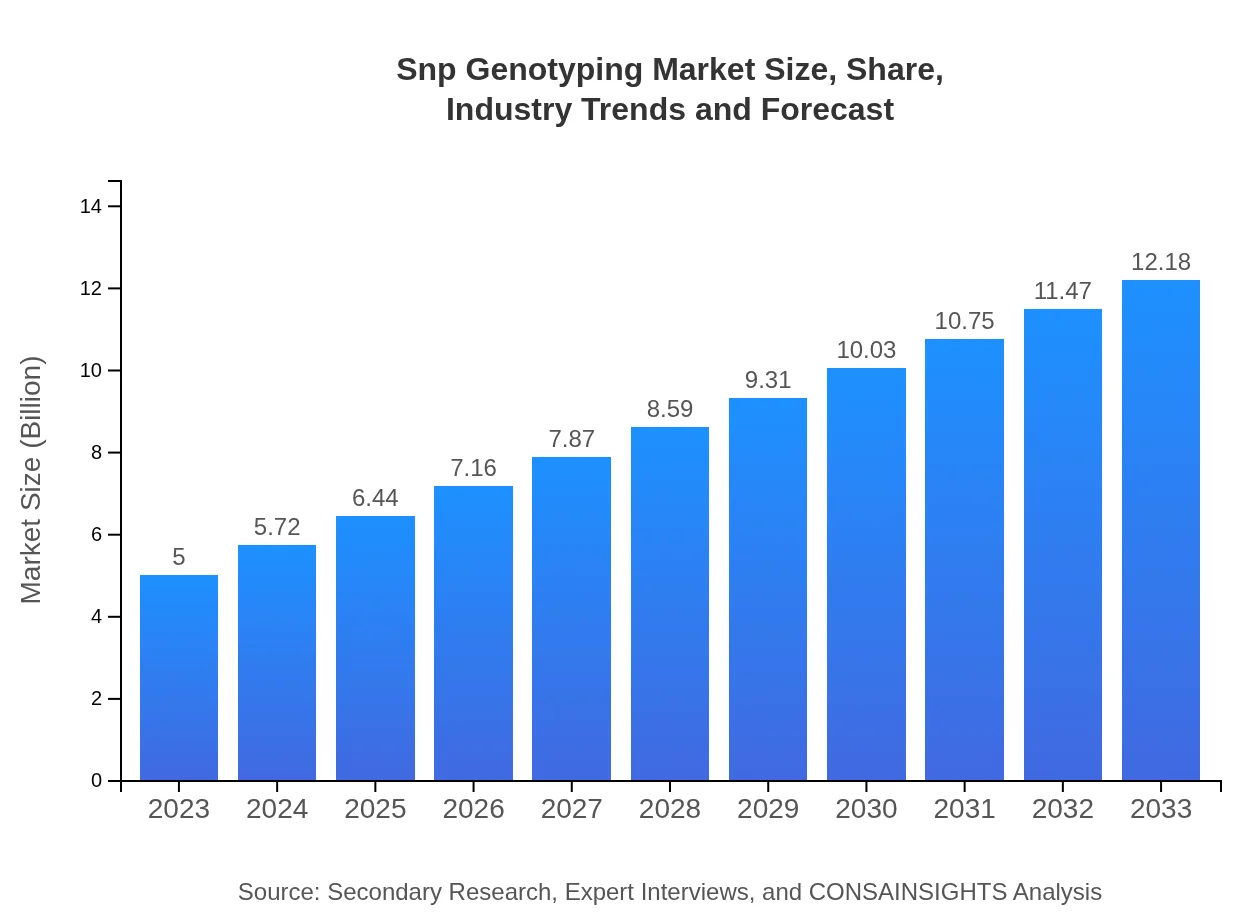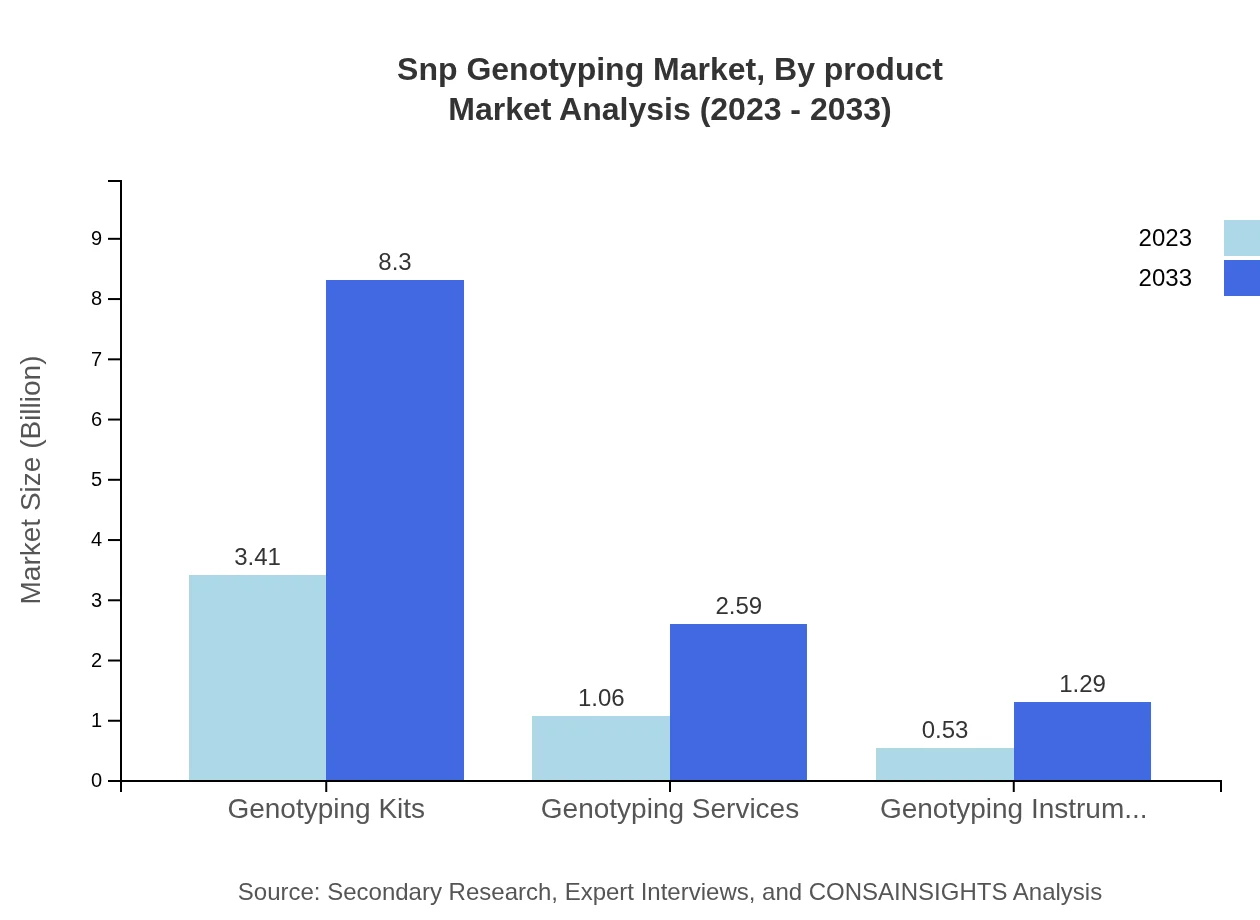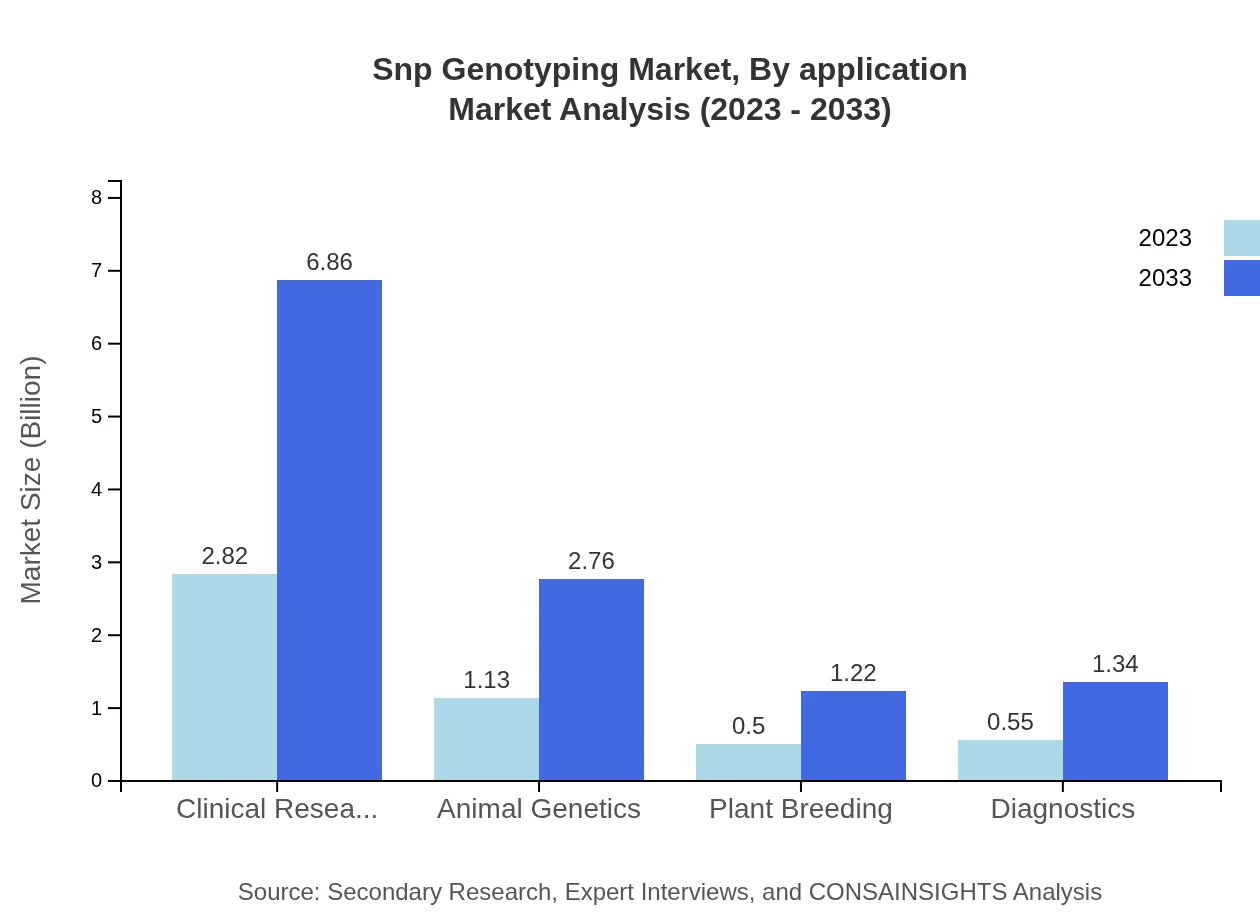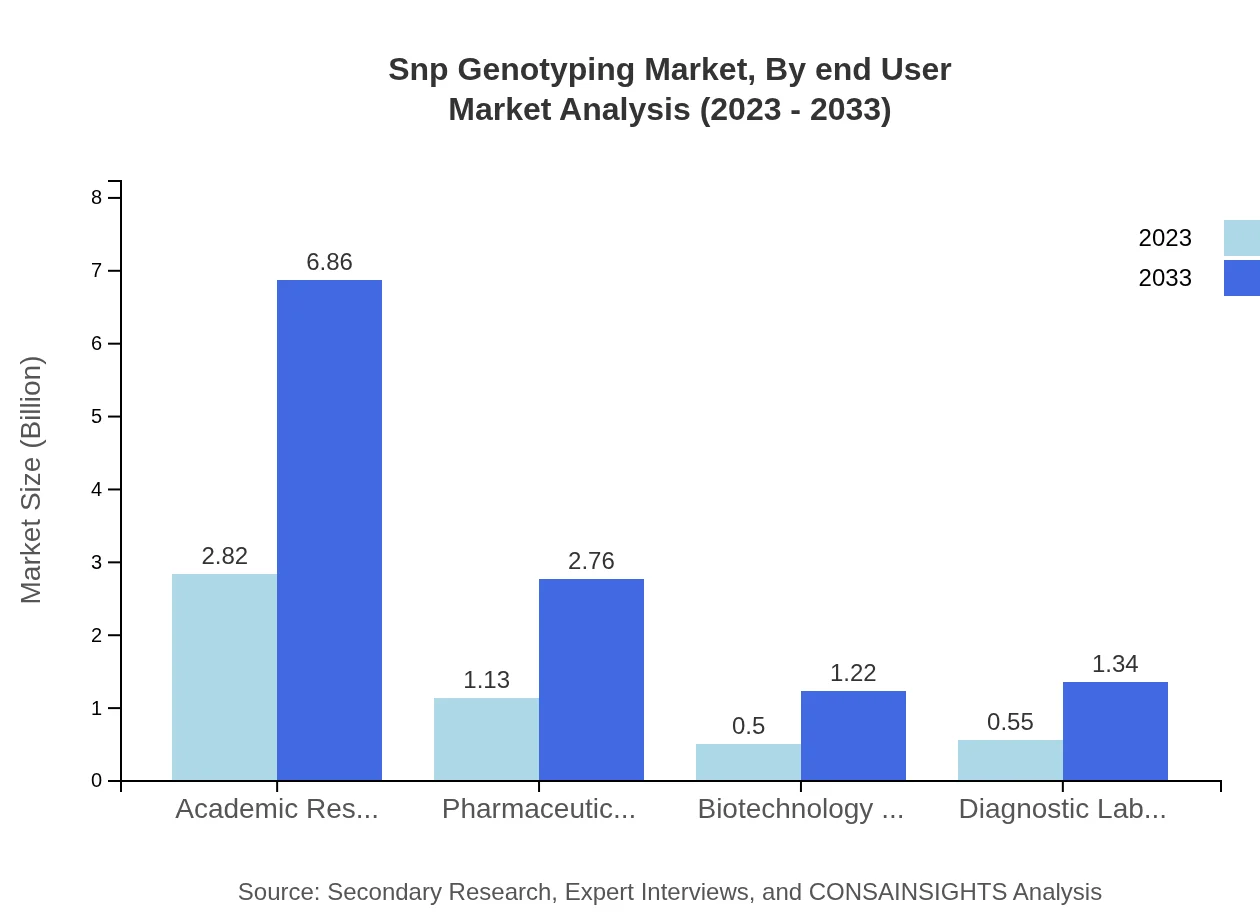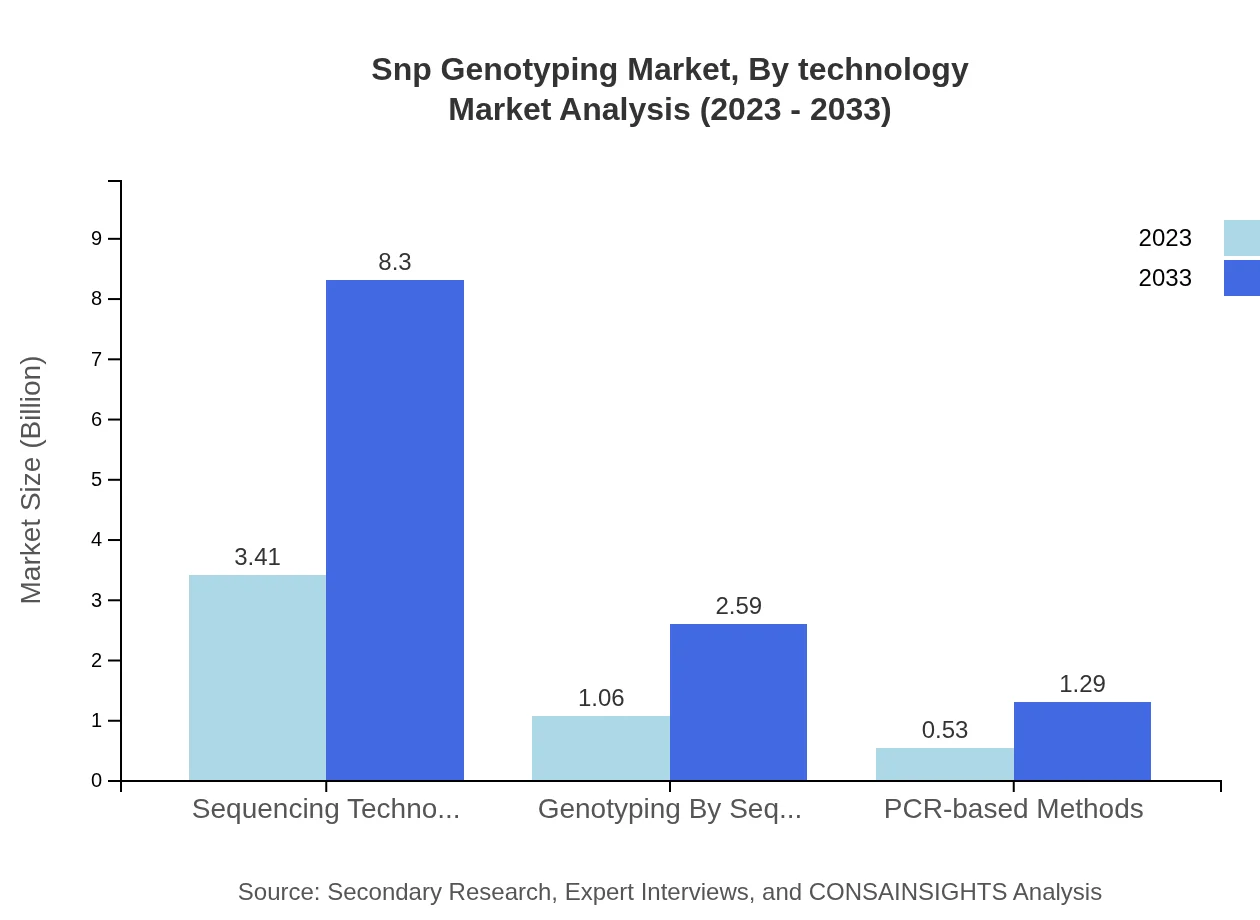Snp Genotyping Market Report
Published Date: 31 January 2026 | Report Code: snp-genotyping
Snp Genotyping Market Size, Share, Industry Trends and Forecast to 2033
This report provides an in-depth analysis of the Snp Genotyping market, examining current trends, market dynamics, and future projections for the period 2023 to 2033. It covers market size, growth rates, segmentation, and regional insights.
| Metric | Value |
|---|---|
| Study Period | 2023 - 2033 |
| 2023 Market Size | $5.00 Billion |
| CAGR (2023-2033) | 9% |
| 2033 Market Size | $12.18 Billion |
| Top Companies | Thermo Fisher Scientific, Illumina, Inc., Qiagen , Roche, Bio-Rad Laboratories, Inc. |
| Last Modified Date | 31 January 2026 |
Snp Genotyping Market Overview
Customize Snp Genotyping Market Report market research report
- ✔ Get in-depth analysis of Snp Genotyping market size, growth, and forecasts.
- ✔ Understand Snp Genotyping's regional dynamics and industry-specific trends.
- ✔ Identify potential applications, end-user demand, and growth segments in Snp Genotyping
What is the Market Size & CAGR of Snp Genotyping market in 2023?
Snp Genotyping Industry Analysis
Snp Genotyping Market Segmentation and Scope
Tell us your focus area and get a customized research report.
Snp Genotyping Market Analysis Report by Region
Europe Snp Genotyping Market Report:
Europe's Snp Genotyping market is projected to grow significantly from USD 1.36 billion in 2023 to USD 3.31 billion by 2033. The region is known for its stringent regulatory frameworks and advanced research capabilities, enhancing its role in the global market.Asia Pacific Snp Genotyping Market Report:
In the Asia-Pacific region, the Snp Genotyping market is projected to grow from USD 1.10 billion in 2023 to USD 2.67 billion by 2033. The increasing investments in genomics research, particularly in countries like China and India, alongside a burgeoning demand for genetic testing, underscores the region’s potential.North America Snp Genotyping Market Report:
North America remains a significant player in the Snp Genotyping market, with a valuation of USD 1.76 billion in 2023, anticipated to reach USD 4.29 billion by 2033. The region benefits from a strong focus on research and a well-established healthcare system, making it a hub for advanced genomic research.South America Snp Genotyping Market Report:
The South American Snp Genotyping market is relatively smaller, expected to grow from USD 0.47 billion in 2023 to USD 1.16 billion by 2033. Factors driving this growth include improvements in healthcare infrastructure and increasing awareness of genetic disorders.Middle East & Africa Snp Genotyping Market Report:
The Middle East and Africa Snp Genotyping market is expected to increase from USD 0.31 billion in 2023 to USD 0.76 billion by 2033. This growth is fueled by rising investments in healthcare and biotechnology sectors aimed at improving disease diagnosis and treatment.Tell us your focus area and get a customized research report.
Snp Genotyping Market Analysis By Product
The Snp Genotyping market by product comprises genotyping kits, services, and instruments. In 2023, genotyping kits dominate with a market size of USD 3.41 billion, projected to grow to USD 8.30 billion by 2033, covering 68.13% market share. Genotyping services, with a market size of USD 1.06 billion in 2023, are expected to expand to USD 2.59 billion by 2033, holding 21.25% share. Instruments account for USD 0.53 billion and will grow to USD 1.29 billion, maintaining a share of 10.62%.
Snp Genotyping Market Analysis By Application
Applications of Snp Genotyping span across clinical research, animal genetics, plant breeding, and diagnostics. Notably, clinical research represents a significant portion, growing from USD 2.82 billion in 2023 to USD 6.86 billion by 2033 with a 56.32% share. Animal genetics is set to grow from USD 1.13 billion to USD 2.76 billion, maintaining a share of 22.63%. Plant breeding and diagnostics are also emerging segments, highlighting the versatility of SNP technologies.
Snp Genotyping Market Analysis By End User
The Snp Genotyping market by end-user includes academic research institutes, pharmaceutical companies, biotechnology companies, and diagnostic laboratories. With a market size of USD 2.82 billion in 2023, academic research institutes are the largest segment, projected to reach USD 6.86 billion by 2033, accounting for 56.32% share. Pharmaceutical companies will grow from USD 1.13 billion to USD 2.76 billion, covering 22.63%, while biotechnology and diagnostic laboratories each hold 10.05% and 11% market shares respectively.
Snp Genotyping Market Analysis By Technology
Technologies in Snp Genotyping include sequencing technologies, genotyping by sequencing, and PCR-based methods. Sequencing technologies dominate with a size of USD 3.41 billion in 2023, anticipated to grow to USD 8.30 billion by 2033 (68.13% share). Genotyping by sequencing will evolve from USD 1.06 billion to USD 2.59 billion (21.25% share), while PCR-based methods are also crucial with a projected size growth from USD 0.53 billion to USD 1.29 billion (10.62% share).
Snp Genotyping Market Analysis By Region
Global SNP Genotyping Market, By Region Market Analysis (2023 - 2033)
The segmentation by region highlights the North American and European markets as leaders, driven by advanced research environments. The Asia-Pacific region, though smaller, shows significant growth potential, while South America and the Middle East and Africa are marked as developing markets, offering future prospects.
Snp Genotyping Market Trends and Future Forecast
Tell us your focus area and get a customized research report.
Global Market Leaders and Top Companies in Snp Genotyping Industry
Thermo Fisher Scientific:
A leader in the field, Thermo Fisher Scientific provides a range of genotyping products, platforms, and services, aiding researchers and clinicians in genetic analysis.Illumina, Inc.:
Illumina is known for its cutting-edge sequencing technologies and genotyping platforms, revolutionizing genomic research and clinical diagnostics.Qiagen :
Qiagen offers advanced genotyping solutions combined with robust bioinformatics, driving the integration of SNP testing into clinical processes.Roche:
Roche is at the forefront of diagnostic innovations, contributing significantly to the Snp Genotyping market with its expansive portfolio of genotyping solutions.Bio-Rad Laboratories, Inc.:
Bio-Rad specializes in instruments and reagents for life sciences research, playing a vital role in the genotyping ecosystem.We're grateful to work with incredible clients.









FAQs
What is the market size of SNP Genotyping?
The SNP-genotyping market is expected to grow from $5 billion in 2023 at a CAGR of 9%. By 2033, the market size will increase significantly, reflecting the growing demand for genetic analysis and precision medicine.
What are the key market players or companies in this SNP Genotyping industry?
Key players in the SNP-genotyping industry include Illumina, Thermo Fisher Scientific, and Qiagen, leading the market through innovative technologies and services, enhancing their offerings in genotyping kits and related services.
What are the primary factors driving the growth in the SNP Genotyping industry?
The primary growth drivers for the SNP-genotyping industry include advances in sequencing technology, rising demand for personalized medicine, and increasing investments in genetic research by academic and pharmaceutical entities.
Which region is the fastest Growing in the SNP Genotyping?
The fastest-growing region in SNP-genotyping is North America, increasing from $1.76 billion in 2023 to $4.29 billion by 2033, driven by robust research initiatives and high adoption rates of advanced genomics technologies.
Does ConsaInsights provide customized market report data for the SNP Genotyping industry?
Yes, ConsaInsights offers customized market report data tailored to client specifications in the SNP-genotyping industry, ensuring relevant insights for strategic decision-making.
What deliverables can I expect from this SNP Genotyping market research project?
Deliverables from the SNP-genotyping market research project include detailed market analysis reports, competitive landscape assessments, growth forecasts, and insights based on regional and segment-level data.
What are the market trends of SNP Genotyping?
Current trends in the SNP-genotyping market highlight a shift towards precision medicine, increased usage of genotyping kits, and a growing focus on academic research, particularly in the areas of clinical and pharmaceutical applications.

